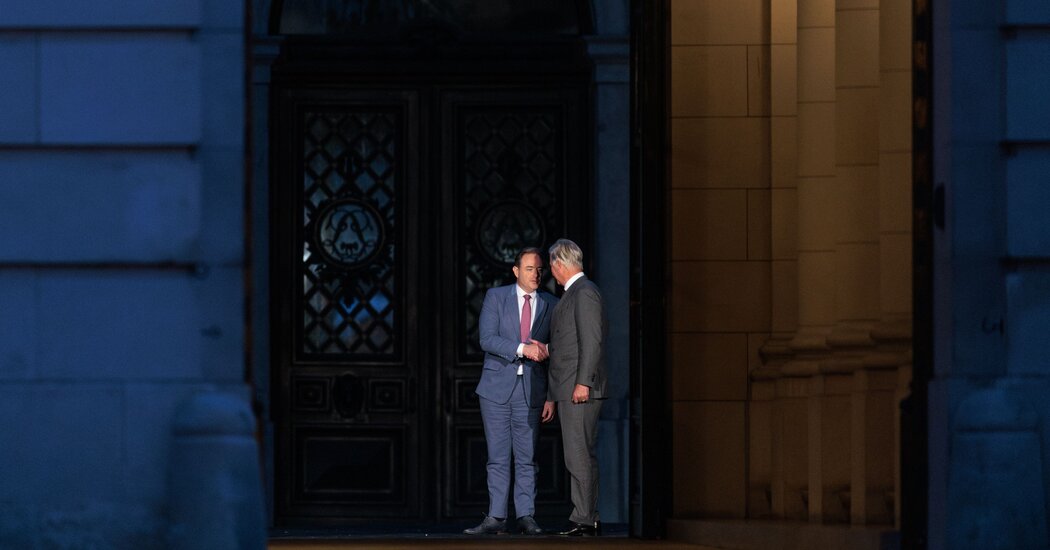Belgium reached an agreement to form a coalition government on Friday, the nation’s monarchy announced, ending seven months of partisan squabbling over deeply unpopular proposed cuts to social spending and other issues. Full details about the agreement were yet to be officially released.
The new government was formed under the stewardship of Bart De Wever, the leader of a conservative Flemish nationalist party, the New Flemish Alliance. The party won elections in June with 17 percent of the vote, the largest share of the contenders, in a win that was a victory over a far-right separatist party.
With Friday’s agreement, Mr. De Wever is poised to become the country’s next prime minister, leading a five-party coalition that has been negotiating with a hard line on migration and cuts to the country’s pension and heath care systems. Mr. De Wever’s party joined forces with the liberal Reformist Movement and the centrist Les Engagés, two Francophone parties, as well as the Flemish socialist party Vooruit (Forward) and the party Christian Democratic and Flemish.
Belgium, whose capital, Brussels, is home to the headquarters of both the European Union and NATO, has a population of just 12 million people and represents only about 3.4 percent of the European Union’s total gross domestic product. But it faces many of the challenges common to European nations, including an aging population that is driving up the cost of its pensions and health care.
Partly because of that, the nation has a relatively large deficit, around 4.6 percent of gross domestic product last year, based on estimates. European Union fiscal rules that went into effect last year have ramped up the pressure to control costs.
If the country does not submit a budget plan to the European Union on time, it risks being placed on a strict four-year adjustment path and could eventually face penalties and fines.
The ultimate deal to form a government is expected to include substantial budget cuts, increased military spending and cuts to some taxes, based on leaks previously reported by news outlets. The agreement’s details had not yet been released as of late Friday night in Belgium, but at least some parties suggested that many popular spending programs had been sustained.
On social media, Maxime Prévot, leader of the centrist coalition party Les Engagés, posted that it was “a reform agreement for the future, which guarantees indexation and ensures the payment of pensions for today and tomorrow.”
A protracted process for forming a government is not new to Belgium; one standoff in 2010 and 2011 set a world record, with the parties taking 541 days to form a coalition.
Usually Belgium’s drawn-out negotiations are attributed to deep divisions between Flanders, Belgium’s Dutch-speaking and more right-leaning northern region, and Wallonia, the nation’s French-speaking and more left-leaning southern part.
But this time, an additional complication slowed the process: the need to rein in the nation’s budget deficit.
Making cuts to pensions and health care is a challenge in many European countries. France’s decision to raise the retirement age to limit spending led to mass protests, and this month the country’s prime minister said he would consider a change in the law.
Belgium has been facing its own version of that problem as it tries to balance treasured social norms with a harsh fiscal reality. In recent weeks, teachers, military personnel and trade unionists have staged strikes and protests against pension-reform proposals that had been leaked to news outlets.
Belgium’s system of automatic wage adjustments to inflation also became a flashpoint in the negotiations. The negotiators looked to curb them to reduce government wage bills and make Belgium more competitive, even as centrist and left-wing parties were concerned about how changes would affect workers. Other issues that caused talks to break down included social benefits, pensions, health care and a proposed capital gains tax.
The agreement must still be approved by party congresses. In its post on Friday confirming that an agreement had been reached, the Belgian monarchy said that the date of the swearing-in of the prime minister and new members of the government would be announced later.

